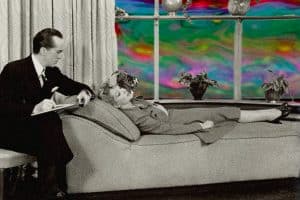One morning, a plain brown box arrived on my doorstep. According to the sender, the contents inside should be handled carefully, because they could change my life. “EMPOWER YOUR INNER HEALER” was printed on the box’s inner flap—a savvy marketing mantra from a company taking ketamine therapy out of clinics and into your living room. A strange feeling of transgression came over me as I ripped open the packaging, uncovering a strip of ketamine lozenges—bright blue, candy-like tablets stamped with the company’s floral logo. They reminded me of giant ecstasy pills. I wondered: how is this even legal?
Ketamine therapy is a burgeoning industry built on novel legal grounds. While ketamine is a controlled substance first synthesized as an anesthetic in the 60s, conversations about it as a mental health treatment only began gaining traction in the 2000s, when a wave of research showed its potential as an antidepressant. This led to a spike in consumer demand for ketamine as a therapeutic treatment, and a cottage industry of clinics grew around providing access to the drug as a wellness tool—often charging hundreds of dollars per session and thousands for the recommended full course of sessions. Then, during the pandemic, Congress passed provisions that allowed clinicians to prescribe medications virtually, a legal shift that transformed both the ketamine industry and healthcare at-large.
READ: Does Ketamine Have A Dark Side?

A surge of investments came into the telehealth space, and a growing number of startups began advertising to customers with the promise of providing ketamine therapy, at more accessible prices than clinics, directly to their homes. At a time when interest in psychedelic medicine is growing, longtime stakeholders have continually emphasized the importance of access—and the ketamine lozenge model centers that. But the industry is facing increasing scrutiny, too: ketamine telehealth platform Peak announced in September that it is “winding down” its services after Rolling Stone reported that it was advertising to Zoomers on TikTok. Concerns are mounting that companies are scaling too quickly with the promise of a panacea—and not much regulatory oversight or safety guardrails. Could this be too much, too fast?
“I joke a lot that direct-to-consumer ketamine companies are like glorified drug dealers,” said Lauren Taus, a long-time ketamine-assisted psychotherapist. Taus, like many psychedelic insiders, is concerned that ketamine companies are adopting the profit-driven practices of Silicon Valley startups, prescribing the drug unscrupulously without adequate medical expertise and guidance. Ketamine is a Schedule III substance, so clinicians are required to register with the DEA to dispense it, but doctors prescribing it for depression and other mood disorders are doing so off-label—a practice not overseen by regulatory standards which, instead, relies on self-policing by providers. “This is pioneering territory, and there’s going to be collateral damage,” Taus continued. “There’s a shadow side to ketamine’s benefits—a lot of addiction.”
This fall, I signed up for ketamine therapy with two competing companies in this new marketplace, Wondermed and Better U, which offer month-long programs for $399 and $596, respectively. These packages include four ketamine treatments, one virtual session with an integration coach to unpack the experience, and an online member portal that includes journal prompts, musical soundtracks, mindfulness exercises, and educational information. (Wondermed also sent a box with a blood pressure monitor and assortment of wellness accouterments—eyeshades, journal, and anti-nausea herbal supplements.)
Qualifying for these treatments required jumping through several requisite hoops: first taking an online survey about my mental health, then video chatting with a nurse about my medical history, and finally, meeting with a psychiatrist over Zoom, who diagnosed me with anxiety and wrote my script. According to Wondermed, one out of three people are disqualified through the intake survey, and Better U’s CEO Derek Du Chesne showed me internal data that indicated the company refunds nearly 20 percent of prospective customers due to issues like medical contraindications, substance use disorders, and lack of social support at home. Du Chesne emphasizes that not all companies offering this at-home treatment are the same and that Better U has worked hard to put rigorous protocols and support systems in place.
How to Grow Shrooms Bundle
Take Both of Our Courses and Save $90!
Still, neither company asked to review my medical and psychiatric records; they simply took me at my word. “I trust you’re telling the truth,” said Wondermed’s lead clinician Lauren Swanson, when I asked if it can be difficult to assess if someone is lying about their medical history. “This is not a pill mill,” Swanson insisted. “If someone comes from Burning Man and just wants to try ketamine, that’s not what our program is for.”
READ: Ketamine for Depression: The Highs and Lows

To be fair, self-reporting measures are not exclusive to ketamine therapy—regular psychiatrists rely on an honor-based system when prescribing other medicines too. Ketamine companies do have to follow certain legal requirements, like running prospective patients through the Prescription Monitoring Program (PMP)—a state-run database that tracks prescriptions of controlled substances. Still, the relative ease of getting a ketamine prescription these days reminded me of the pre-recreational cannabis era in California, when all you had to do was saunter into the office of a disheveled weed doctor and complain about your “insomnia” to get a medical cannabis card.
The ease of obtaining prescription ketamine has made it a status symbol in both underground nightlife and tech-adjacent circles. Despite these companies’ insistence that their programs are not for the keta-curious, venture capitalists are already running around pumping ketamine nasal sprays at Burning Man and beyond. Perhaps the most significant change that telehealth companies are stewarding is removing barriers to access that have so far relegated medical ketamine as a luxury wellness tool for wealthy coastal elites—allowing a wider net of middle-class folks, or those living in rural areas, to access a drug that can be profoundly healing.
Chris Witaske, an actor in Los Angeles, had been doing talk therapy for ten years when he became curious about ketamine. But his psychiatrist laughed when Chris inquired about it, telling him that he would never prescribe ketamine to a patient. So Chris signed up for Mindbloom, a ketamine telehealth company that came recommended by a friend. “I felt this very deep, cathartic experience—like my inner healer was telling me stuff I needed to focus on and release,” Witaske said. “It unlocked stuff I couldn’t get through traditional talk therapy or meditation.”
From personal experience, I can say ketamine generates a uniquely dissociative state that allows you to view your life in cold abstraction—without the subjective distortions of trauma, incessant chatter of self-criticism, or maybe even just feelings. The numbing sense of calm that ketamine envelops you in perhaps makes it an easier aid for plumbing the subconscious than more mischievous medicines like magic mushrooms or ayahuasca, where trips can take more unpredictable turns. Still, unprocessed muck often bubbles to the surface during psychedelic experiences. It’s for this reason that at-home ketamine companies require you to have a trip-sitter in case of emergencies both medical and psychic, and offer post-trip integration sessions for an extra charge.
Critics of ketamine telehealth companies say these businesses are not providing enough support before, during, and after the sessions. “You can’t get a sense of someone’s deepest psyche in 45 minutes over Zoom,” said Amy Coleman, a clinical social worker who is trained in ketamine-assisted psychotherapy. “It takes time for people to blossom relationally with the therapist.” Coleman notes that there is a big difference between having an ongoing, in-person relationship with a practitioner who prescribes you some ketamine lozenges for use at home, versus signing up for a telehealth program where the therapy is self-directed, and conducted primarily over text or video chat. “Just because it’s legal doesn’t mean it’s ethical,” she said.
Late one night after work, I tried my first ketamine therapy session in my friend’s bedroom. She lit candles and burned incense around me as I wrote a few intentions in my journal, then stuck a lozenge under my tongue. The tablet dissolved slowly, and its initial minty flavor gave way to a bitter, chemical taste. I hit play on the audio accompaniment the company had provided, and a robotic female voice encouraged me to “surrender to the process” over an ambient soundtrack of moody synth pads infused with campy pan flutes. One of ketamine’s superpowers is that—unlike traditional SSRIs—its therapeutic effects are felt immediately, and as my body relaxed into a deep sense of calm, I shrugged off anxiety like a heavy coat. The next day, I was still glowing.
So say what you will about the woo, but at-home ketamine programs are pioneering a model that could eventually be the future of psychedelic therapy—an increasingly professionalized industry that will likely include MDMA and psilocybin soon. Should psychedelics be widely available for all, strictly limited to those who are most suffering, or pushed as a wellness tool with a patina of medicalization? As society trips through this complex question, these trailblazing ketamine companies and their business ethics will determine whether governing bodies will eventually curtail this nascent industry with regulatory legislation—and how psychedelic therapy-at-large is viewed in the mainstream.
Disclaimer
This article is intended for harm reduction purposes and should not be used in place of medical advice. DoubleBlind does not advocate participating in illicit activities. Always consult your local drug laws before engaging with any unregulated substance.
In the event of an emergency, please dial local emergency services. For mental health services in the US, dial 988. For substance abuse help in the U.S., please dial the Substance Abuse and Mental Health Services Administration National Helpline at +1 (800) 662-4357.

DoubleBlind is a trusted resource for news, evidence-based education, and reporting on psychedelics. We work with leading medical professionals, scientific researchers, journalists, mycologists, indigenous stewards, and cultural pioneers. Read about our editorial policy and fact-checking process here.

DoubleBlind Magazine does not encourage or condone any illegal activities, including but not limited to the use of illegal substances. We do not provide mental health, clinical, or medical services. We are not a substitute for medical, psychological, or psychiatric diagnosis, treatment, or advice. If you are in a crisis or if you or any other person may be in danger or experiencing a mental health emergency, immediately call 911 or your local emergency resources. If you are considering suicide, please call 988 to connect with the National Suicide Prevention Lifeline.



